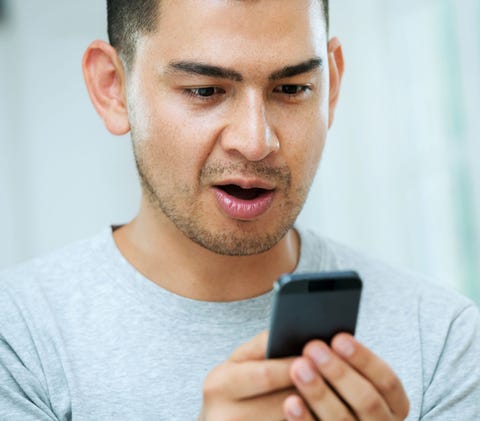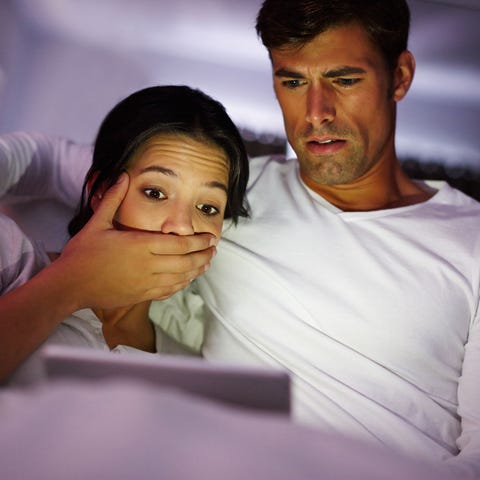It’s been about four years since Sandra Lee, M.D., AKA Dr. Pimple Popper, posted a video of herself extracting tiny cysts and pore clogs from a patient’s face. Hundreds of uploads and millions of views later, the genre of pimple-popping videos has exploded in popularity, and Dr. Pimple Popper even has her own show on TLC.
From rock-hard blackheads to oozing cysts, zits can be pretty gross. So why do we love to watch other people pop them?
To understand the appeal of these gross vids, consider first why it feels so good to watch pus shoot out of your own face. Abigail Cline, M.D., Ph.D. of the Center for Dermatology Research at the Wake Forest School of Medicine, says people self-extract—the technical term for popping your pimples—for many reasons. Some might pop their zits because it seems like a quick and easy fix, while for others, there’s more to it.
“Some people may get a sense of control and satisfaction that they are ‘treating’ themselves. They are cleaning or ridding their body of something that doesn’t belong,” says Dr. Cline. “Others might enjoy the grotesque aspect of extractions and feel a bit of bizarre fascination when they see the outburst of pus.”

Getty ImagesAdrianko
Marc LaFrance, an associate professor of sociology at Concordia University, says that acne can be very frustrating, and popping can feel empowering. “It allows for the momentary and fleeting experience of having some control over a phenomenon that you didn’t choose and that you’re going to have a lot of trouble eradicating, in many cases,” he says.
LaFrance’s research on acne has also led him to another theory: Humans have a fascination with what lies beneath our skin, the body fluids and parts we don’t usually see. By popping a pimple, you breach the barrier between the outside and inside of your body, which can be compelling and even titillating. “I think there is something almost instinctive about it,” he says.
When you watch someone else attack their acne on video, you just might activate those same feelings of control and fascination, plus even more.
First, there’s the disgust factor. Humans have evolved to be disgusted by other peoples’ oozing skin conditions as a defense mechanism against catching infections, research from the UK suggests. In small, controlled doses, however, disgust can be satisfying. “The concept of ‘benign masochism’ illustrates how humans are attracted to experiences that produce undesirable emotions, such as disgust,” says Dr. Cline. Benign masochism also makes scary movies appealing, research shows.
“People might take pleasure in the mind-over-body aspect of conquering their innate repulsion,” says Dr. Cline. “You’re testing yourself to see how much you can tolerate before you look away. When watching a popping video, some audience members get a rush of dopamine, while others get a rush of nausea.”
There’s also a voyeurism element at play here, LaFrance says. “You can engage in the voyeuristic activity of watching somebody else pop their pimples knowing that it’s going to have no ramifications for your own skin,” he says. LaFrance’s research suggests that many people who pop pimples feel guilty afterward because they know their squeezing could lead to scarring. When you watch someone else, “you get to participate in the deeply gratifying experience of pimple popping without actually injuring your own skin, so there’s no guilt,” LaFrance says.

Getty Imageslaflor
Finally, if you have acne yourself, then watching pimple-popping videos can help you feel more comfortable in your skin. “It builds community around a form of stigmatization, which can have a strong positive emotional impact for those who suffer from acne,” LaFrance says.
More than 50 million Americans have acne, according to the American Academy of Dermatology, so you’re not the only one with imperfect skin.
In fact, dermatological conditions shouldn’t only be associated with negative emotions such as shame, disgust, and sadness, Dr. Cline says. “Too often with Photoshop and filters people think that flawless skin is the norm,” she says. “People think if your skin isn’t perfect, then something is wrong. But the familiar saying ‘beauty is only skin-deep’ should remind everyone that external attractiveness has no relation to goodness.”
Now that you know why you like pimple-popping videos, you can watch them with newfound appreciation. Just don’t let them inspire DIY work: Popping your own zits is a risky move, because you can push the contents of your pimples deeper into your skin, increasing inflammation and making acne worse, Dr. Cline says. A medical professional does it with gloves, alcohol wipes, and sterile tools.
If your skin needs some help, check out these common causes of adult acne and the 7 best pimple creams to treat it.
Source: Read Full Article
